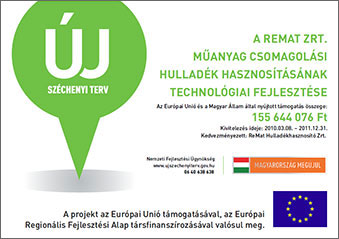A total investment package worth HUF 311 million was implemented at the Tiszaújváros plant of ReMat Hulladékhasznosító Plc. In order to make the utilization of plastic film waste more efficient, for which our company won HUF 155 million in the GOP-2009-2.1.4 / H .
As part of the development, which was completed on October 26, 2011, a completely new – Erema-type – regranulation line was put into operation at the plant, the purchase of which alone cost HUF 170 million.
The capacity of the new machine is 600 kg / hour, through which our company will increase production by 660 tons per year, practically doubling the utilization capacity of the population in the processing of waste from selective collection.
ReMat Plc also purchased a new 300 kg/h water film grinding and washing system for the pre-treatment of increasing amounts of plastic waste of residential origin. The grinder uses a so-called 15-20 mm size of incoming and pre-sorted plastic waste. creates a film grind which, after washing, is dried by compression and then comminuted to an even finer particle size, preparing the material for regranulation. A new crane will also help move and maintain the new equipment.
As part of the investment, the wastewater pre-treatment system of the plant was further expanded, thus ensuring the pre-treatment of the increasing amount of wastewater in accordance with environmental regulations with regard to dry matter.
Additional investments also included the purchase of one hundred roller containers to store incoming waste and finished secondary raw material.
In addition, a new 600kWh transformer was installed at the company’s site to meet the plant’s growing energy needs, while the sorting hall was equipped with 8 cm of internal thermal insulation to increase energy efficiency, significantly improving employee comfort.
Fundamental changes are taking place in waste management in Hungary, as part of which there is an increasing emphasis on the selective collection and recovery of waste. ReMat Plc. Also intends to contribute to this with the new development handed over in the autumn of 2011, which intends to further increase the amount of secondary raw materials produced from waste in its now modernized plant in Tiszaújváros in the coming years.

